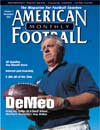AMERICAN FOOTBALL MONTHLY THE #1 RESOURCE FOR FOOTBALL COACHES
Article CategoriesAFM Magazine
|
He Knows the Way In San JoseAthletic Director Chuck Bell is leading San Jose State in the right direction.by: Rod Smith © More from this issue In a geographical area of California well-known for its technology innovations and sports achievements' San Jose State's Chuck Bell knows that his athletic teams must be competitive if people are to identify with, much less attend Spartan athletic events. But grappling for attention in Silicon Valley and the San Francisco Bay Area, where competitiveness is cutting edge, can be difficult. All the same, Bell, who is nearing the end of his third full year as athletic director at SJSU, doesn't shy away from the many challenges of maintaining and even reshaping an athletic department that is on the cusp of the national spotlight. If you want proof, there's the Silicon Valley Football Classic. This New Year's Eve bowl game - which Bell and his San Jose associates conceptualized and then made a reality last year - could not only revitalize ....The full article can only be seen by subscribers. Subscribe today!
|
|
|||||||
| HOME |
MAGAZINE |
SUBSCRIBE | ONLINE COLUMNISTS | COACHING VIDEOS |
Copyright 2025, AmericanFootballMonthly.com
All Rights Reserved





